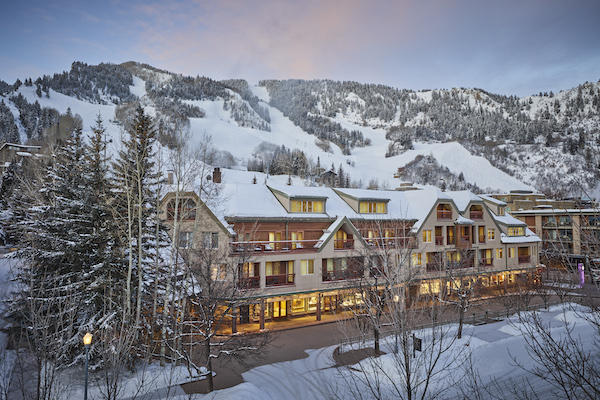Its name says it all: Aspen Hospitality. For anyone who has clicked into a pair of skis or strapped on a snowboard, Aspen summons fluffy snow, tipples around the fireplace and Moncler as far as the eye can see. There, in this snow haven, sits a little gem, The Little Nell, a 92-room sybaritic ski-in/ski-out hotel favored by jetsetters and owned by Aspen Hospitality, a division of Aspen Skiing Company, which formally launched earlier this year, with a portfolio of other Colorado properties, including Limelight Hotel Aspen, Limelight Hotel Snowmass, The ASPENX Mountain Club and The Snowmass Mountain Club. It also has the Limelight Hotel Ketchum, close to Sun Valley, Idaho, and has two other Limelight properties scheduled to open in the next few years in Mammoth, Calif., and Boulder, Colo.
Up to now, Aspen Hospitality has stuck mainly to the slopes, but in the upcoming Limelight Denver, it’s taking its brand of hospitality to the city. In February, Denver-based Continuum Partners sold an interest in the Kimpton Hotel Born, which it had opened in 2017, to Aspen Hospitality, under which the 200-room hotel will convert to the Limelight Denver later this year. Notably, the hotel will shed the IHG Kimpton flag and turn over to the Limelight, a homegrown brand that outside the ski slopes, not too many know about.
At the time, Aspen Hospitality CEO Alinio Azevedo said of the deal: “With Limelight Denver, we are excited to expand our brand beyond mountain and ski locations into an urban market.” Like the miners of Denver yore, Aspen Hospitality is looking to find gold in the Union Station neighborhood.
If so, Azevedo will have a lot to do with it. He became CEO this year, part of a 25-year career that includes stops at Loews Hotels and Four Seasons Hotels and Resorts and advisory services for Ernst and Young.

A FORMAL APPROACH
For years, Aspen Skiing Company, owned by the Crown family, a diversified company that beyond hotels has interests in sports (it owns stakes in the Chicago Bulls and New York Yankees) and trophy real estate (the family co-owns Rockefeller Center in New York), focused most of its attention on ski area operation. But it had an ace up its sleeve in The Little Nell, which opened in 1989, and, with further hospitality investments in 2009 up until today, it made sense, according to Azevedo, to splinter off a group focused solely on hotel ownership and operations.
“They said, ‘Look, there’s something here that we’ve been growing, let’s start to think about this in a more professional, organized way,’” said Azevedo, who came onboard in 2017. Now, the group isn’t just settling for mountain and ski areas, but branching out with its brands in urban markets, like with Denver.
Aspen Hospitality is something of a unicorn in the hotel industry: it owns, operates and brands all assets it has interests in. It’s highly unusual: more and more, companies specialize on one thing, whether it’s branding/franchising (Marriott, Hilton, IHG, Wyndham, for example), owning (real estate investment trusts, such as Host Hotels & Resorts) or operating (third-party management companies, such as Aimbridge Hospitality).
“It doesn’t mean that we’re 100% owners in everything that we touch, but it does mean that we’re not a 0% owner in everything that we touch; we like exposure to the real estate side of the business,” Azevedo said. The idea behind this structure, according to Azevedo, is that it cuts down on the conflicts that can crop up when there are too many hands in the cookie jar.

“We are building a connected platform of properties, both of the Limelight and The Little Nell brand,” he said. (Without giving away details, Azevedo said Aspen has been working on a Little Nell deal “that is making significant process.”)
Five years into his tenure, Azevedo said there is now a platform in place that is fully organized around hotel investment and management. Fueling them both is a massive customer database and following. Turms out, the affluent ski community isn’t always skiing and is seeking out experiences—both leisure and corporate—beyond Aspen. “There’s a ton of people with high-disposable income that come through this place every year,” Azevedo said. “We have a relationship with them and the idea is how do we serve them in other places?”
The Denver deal was an offshoot of this. There are only 200 miles between Aspen and Denver and many travelers who stay at Aspen Hospitality properties in Aspen are Denverites. “Being that Denver is kind of the connection and way through the mountains, it makes a lot of sense for us,” Azevedo said. The other benefit of the hotel is its attachment to Union Station, which is connected to Denver International Airport.
The Limelight is Aspen Hospitality’s anchor brand with six hotels and three residences carrying the moniker. While Little Nell sits in the five-star luxury stratosphere, Limelight is more approachable, what Azevedo called “elevated casual.”
Limelights, for example, don’t offer room service in their current form, but do feature live music programming as part of its amenities. However, as Aspen Hospitality does expand the brand, Azevedo said they could flex to serve the needs of specific markets, such as Denver, which will have distinct services and amenities from the flagship Limelight Aspen. “We’re trying to not play the anti-big and corporate strategy where everybody gets a SOP to follow—copy and paste,” Azevedo said. “We want to make decisions and make the properties as local as possible.”
Like with Denver, Aspen Hospitality’s expansion of the Limelight brand will go back to linkages. “There’s a lot of connectivity between skiers and surfers or people that kite surf,” Azevedo said. “We’re looking to capitalize on those opportunities.”
